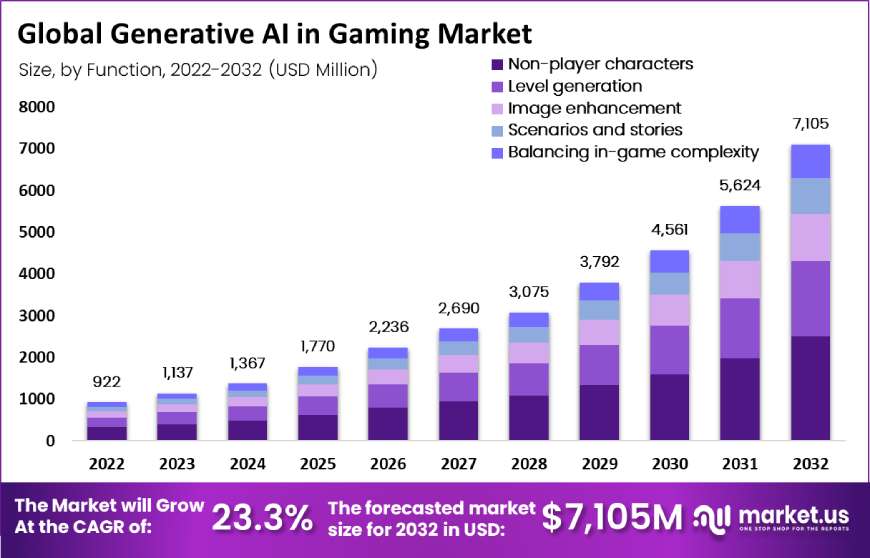Generative AI is a type of artificial intelligence that can create new, original content. This content can be in the form of text, images, or even virtual environments. In the gaming market, generative AI is being used to personalize learning experiences, automate content production, and enrich educational resources.
Market Insights
The global generative AI in gaming market was valued at USD 922 million in 2022. It is projected to experience a remarkable compound annual growth rate (CAGR) of 23.3% between 2023 and 2032. By 2032, the market is expected to reach a valuation of USD 7,105 million.

Here are some of the ways that generative AI is being used in gaming:
- Personalized gaming experiences: Generative AI can be used to create personalized gaming experiences for each player. This is done by analyzing player data, such as their past performance, learning styles, and interests. The generative AI algorithm can then create a personalized gaming path and content tailored to meet the individual needs of each player. This allows players to progress at their own pace, filling knowledge gaps and deepening understanding.
- Automated content production: Generative AI can be used to automate content production. This can free up game developers to focus on more creative and strategic tasks, such as designing gaming experiences and providing feedback to players. Generative AI can be used to create a variety of gaming content, including levels, characters, and even storylines. This can save game developers a lot of time and effort, and it can also help to ensure that the content is accurate and up-to-date.
- Enriched gaming resources: In addition to personalized gaming experiences and automated content production, generative AI can also be used to enrich gaming resources. For example, generative AI can be used to create virtual worlds that allow players to explore and learn about different cultures or historical periods. Generative AI can also be used to create interactive simulations that help players to understand complex concepts. This can make gaming more engaging and immersive, and it can also help players to better understand the concepts they are learning.
In this article, we will explore the top 15 companies that are leading the way in the generative AI in gaming market.
1. OpenAI
OpenAI is at the forefront of generative AI research and development. Their AI models, such as GPT-3, have been leveraged to create interactive and dynamic gaming experiences. OpenAI’s technology enables game developers to generate realistic characters, narratives, and game environments, pushing the boundaries of what is possible in gaming.
2. Nvidia
Nvidia is renowned for its advancements in graphics processing units (GPUs) and deep learning technologies. They have developed AI-powered tools and frameworks that empower game developers to harness the potential of generative AI. Nvidia’s technologies enable the creation of lifelike visuals, realistic physics, and procedural generation of game content.
3. Unity Technologies
Unity Technologies offers a powerful game development platform that incorporates generative AI capabilities. Their AI-driven tools allow developers to create intelligent NPCs (non-player characters), dynamic storylines, and adaptive gameplay experiences. Unity’s platform empowers developers to leverage generative AI to enhance game realism and player immersion.
4. Electronic Arts (EA)
Electronic Arts, a leading game publisher, has embraced generative AI to enhance their game development processes. They utilize AI algorithms for procedural generation of game assets, such as landscapes, objects, and textures. EA’s adoption of generative AI technology has enabled them to streamline game development workflows and deliver visually stunning and immersive games.
5. Sony Interactive Entertainment
Sony Interactive Entertainment has been actively exploring the potential of generative AI in gaming. Their research focuses on using AI algorithms to enhance game environments, generate realistic physics simulations, and create intelligent in-game characters. Sony’s dedication to pushing the boundaries of generative AI has resulted in captivating and innovative gaming experiences.
6. Microsoft
Microsoft has invested heavily in AI research and development, including the application of generative AI in gaming. They provide tools and frameworks that enable game developers to leverage AI algorithms for content generation, character animation, and dynamic storytelling. Microsoft’s commitment to generative AI innovation has contributed to the growth and advancement of the gaming industry.
7. Ubisoft
Ubisoft, a prominent game developer and publisher, has integrated generative AI techniques in their game development processes. They utilize AI algorithms for procedurally generated worlds, realistic crowd behavior, and dynamic mission systems. Ubisoft’s implementation of generative AI has led to immersive and engaging gaming experiences enjoyed by millions of players worldwide.
8. Epic Games
Epic Games, known for developing the popular game engine Unreal Engine, has incorporated generative AI capabilities into their platform. Game developers using Unreal Engine can leverage AI algorithms for procedural generation of landscapes, textures, and animations. Epic Games’ commitment to generative AI-driven game development has set new standards for visual fidelity and gameplay innovation.
9. Google
Google has been actively exploring the intersection of AI and gaming. They have developed AI technologies, such as TensorFlow, that empower game developers to leverage generative AI for content creation, level design, and player behavior modeling. Google’s contributions to the generative AI in gaming market have paved the way for new creative possibilities in game development.
10. Square Enix
Square Enix, a renowned game developer and publisher, has embraced generative AI to enhance their game narratives and world-building processes. They utilize AI algorithms to generate dynamic dialogues, adaptive storytelling, and procedurally generated quests. Square Enix’s integration of generative AI has resulted in captivating and immersive game experiences loved by players around the globe.
11. Valve Corporation
Valve Corporation, the developer of popular games like Half-Life and Portal, has been exploring the potential of generative AI in game design and development. They utilize AI algorithms for procedural generation of game levels, intelligent enemy behavior, and adaptive difficulty systems. Valve’s utilization of generative AI contributes to the creation of unique and challenging gameplay experiences.
12. Activision Blizzard
Activision Blizzard, a leading game publisher, recognizes the transformative power of generative AI in gaming. They employ AI algorithms for content generation, player modeling, and real-time analytics. Activision Blizzard’s adoption of generative AI enhances player engagement, personalization, and overall game quality.
13. Bandai Namco Entertainment
Bandai Namco Entertainment has embraced generative AI as a tool to enhance their game development processes. They utilize AI algorithms for character animation, intelligent enemy AI, and procedural generation of game content. Bandai Namco’s integration of generative AI technologies results in visually stunning and immersive gaming experiences.
14. Konami
Konami, a prominent game developer and publisher, has been incorporating generative AI techniques in their game development workflows. They leverage AI algorithms for dynamic game balancing, adaptive difficulty systems, and procedural generation of game assets. Konami’s utilization of generative AI enhances player engagement and ensures a challenging yet rewarding gaming experience.
15. Bethesda Game Studios
Bethesda Game Studios has been exploring the application of generative AI in their game development processes. They utilize AI algorithms for procedural generation of game worlds, interactive storytelling, and adaptive gameplay mechanics. Bethesda Game Studios’ adoption of generative AI contributes to the creation of expansive and immersive game worlds.
In conclusion, these 15 companies are at the forefront of leveraging generative AI in the gaming market. Their contributions and innovations have significantly enhanced game development, leading to visually stunning graphics, immersive gameplay experiences, and dynamic storytelling. As generative AI continues to advance, we can expect even more exciting and transformative developments in the gaming industry.
Another Source of Information



